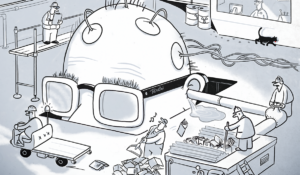There are companies (e.g. Microsoft, Adobe, Yahoo) that understood the pitfalls and are moving away from rating individual performance based on hard metrics towards more frequent and qualitative feedback. They have recognised that rating employees can lead to destructive internal competition, which makes knowledge sharing impossible and corporate culture difficult to flourish. They rather use KPIs to provide employees with more frequent and qualitative information to help them develop their behaviours real time.
The best performance management systems are simple. Above all, their main purpose is to encourage the right conversations about the right topics. These topics are roughly: goals, values, roles and responsibilities. If performance management is simple and clear, it is easier and more often used by managers.
Instead of one-sided blaming on shortcomings and rating on opinions, introduce a two-way, mutually accountable coaching conversation where the dialogue is about how the manager and the team member can work together more efficiently. It is the manager’s responsibility to provide direction, training, coaching, supervision and whatever is needed to help the employee succeed. The manager must hold regular (e.g. weekly, bi-weekly) 1:1s with team members, where they can talk about the past week, give each other feedback on what went well and what could be done better next time. Some companies found it efficient to set a “90-day agreement” based on the outcomes. Most of us work in a matrix organisation, and it also can be beneficial if others provide feedback and inspiration to an employee besides the direct manager.
We also can obtain data on individual performance in less structured ways. Instead of collecting ‘merit points’ and putting people on a performance matrix, e.g. Adobe provides managers with an IT solution where they can take notes of informal discussion. They can search for keywords or tags, which gives richer and visual information instead of pure data comparison.
It is important to separate corrective actions from performance evaluation. Evaluation is a word for praising values, and not to capture no-values, shortcomings or failures. It may make sense to separate conversation about successes and improvement areas, because the last thing an organisation wants is that employees feel like they are being evaluated for dismissal.







